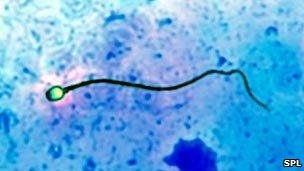'Why sperm donors should be paid more'
- Published

Sperm donors are currently offered £250 to cover lost earnings
Ask a couple struggling to conceive what they would want most in life and "a child" is the obvious answer. They want something money can't buy, even with all the money in the world.
For a couple needing egg or sperm donation this reality might change. Money could buy at least the chance of a child if donors were to be paid, if that's one of the outcomes of the Human Fertilisation and Embryology Authority (HFEA) donation review.
Various issues are being reviewed in the HFEA public consultation, but payment of egg and sperm donors is high on the agenda.
We all agree that the gift a donor brings is priceless - unrepayable, immeasurable happiness. Yet the harsh reality is egg and sperm donors are left out of pocket because paradoxically, it is so priceless they don't get paid at all.
Donors are reimbursed for reasonable expenses only and compensated for loss of earnings up to £250 per cycle.
After public consultation the most likely scenario is that payment for inconvenience will be introduced - a welcome step providing it's balanced.
Wrongly, however, this debate focuses mainly on egg donors as, at first glance, it appears they're doing the hardest work. I argue that sperm donors deserve at least the same payment if not more than egg donors do.
A controversial statement maybe, but as an altruistic egg donor and someone who works with sperm donation, I think this is wholly justified.
Rewarding hard work
One of the biggest myths is that sperm donation is a one-off deed, carrying out a sexual act, supported by adult literature, as lunchtime relief.
As a consequence many sperm donors are secretive, trying to avoid jokes or smutty comments and they feel generally misunderstood about their motives. This is in sharp contrast with egg donors who enjoy an elevated status and whose motives are hardly queried.
Although generally there is little understanding of what egg and/or sperm donation entails, there is this almost instinctive reaction that egg donation is somehow more worthy. This is misguided and wrong.
Sperm donors who go through licensed centres undergo the same series of tests and assessments as egg donors before starting a cycle of donation. The process of donating itself can take as long as three to four months with clinic visits once or twice a week to get the necessary samples.
In addition, there's the requirement to abstain from any form of sexual activity and limit alcohol intake for three to five days before donation.
Assuming they follow the guidelines, it means we're asking healthy men aged between 20 and 45 (and their partners) to have very limited sexual activity for months on end. This has a significant impact on their normal life. That is a serious commitment and one most people are not aware of.
But that's not all. Since the right to donor anonymity was lifted, donors can be traced by their offspring.
As the vast majority of sperm donors agree to donate to 10 families, it also means he has to be identifiable and may be contacted by potentially 10-20 donor conceived people at least one generation later.
This is a lifelong responsibility sperm donors willingly undertake for people they might never know.
Egg donors carry the same responsibility but typically donate to only one or two couples per cycle.
Admittedly the process of egg donation is much more intrusive, involves risks and can be downright unpleasant. I'm not ignoring this and, as an egg donor myself, I know that and have felt it.
Still, we shouldn't base payment solely on medical risk. We should also recognise their commitment, dedication and selflessness and reward the lengths they go through to help others to finally hold that priceless gift: a child.
Just like egg donors, to the families these guys help, they are heroes. And that's something that deserves recognition from us all.